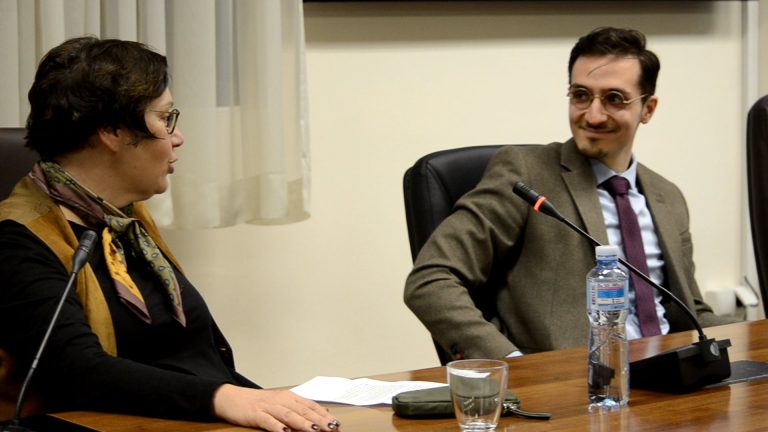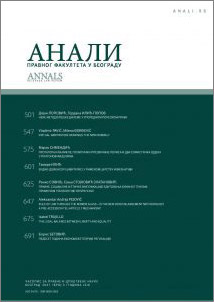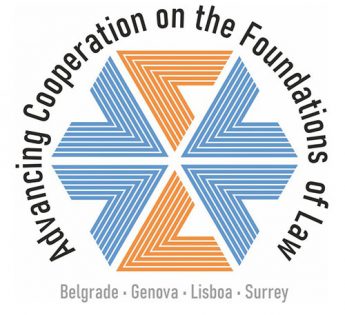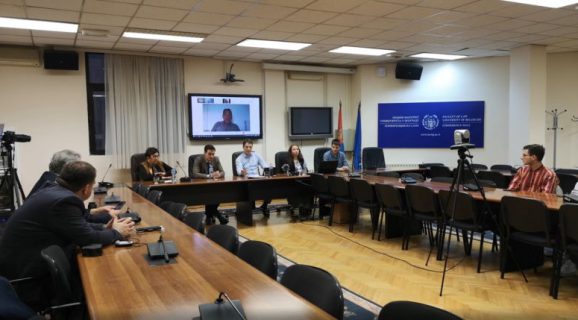
Forvm Romanum: Presentation of Chris Wickham’s „The Inheritance of Rome”
On Friday, the 8th of April, 2022, members of the Forvm had the opportunity to become better acquainted with an important work from the field of cultural, social, and political history – a book called „The Inheritance of Rome: A History of Europe from 400 to 1000” by Chris Wickham, a Professor Emeritus of the University of Oxford. This is the first edition of this book in Serbian; it was published by Clio Ltd. and translated by Marina Adamović Kulenović, the translation itself receiving the „Miloš Đurić” award.
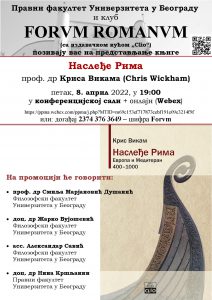 After a brief introduction from Prof. Sima Avramović, the „Forvm Caesar”, who addressed the attendees by a video call from Rome, Prof. Dr Smilja Marjanović Dušanić, Ass. Dr Aleksandar Savić, Ass. Prof. Dr Žarko Vujošević of the University of Belgrade Faculty of Philosophy, and Ass. Prof. Dr Nina Kršljanin of the University of Belgrade Faculty of Law proceeded to tell us more of this book.
After a brief introduction from Prof. Sima Avramović, the „Forvm Caesar”, who addressed the attendees by a video call from Rome, Prof. Dr Smilja Marjanović Dušanić, Ass. Dr Aleksandar Savić, Ass. Prof. Dr Žarko Vujošević of the University of Belgrade Faculty of Philosophy, and Ass. Prof. Dr Nina Kršljanin of the University of Belgrade Faculty of Law proceeded to tell us more of this book.
Prof. Smilja Marjanović Dušanić opened her part of the presentation by reminding the audience of Wickham’s general views on studying history, such as the need to deideologize Marxistic historiography and use its remaining methodological framework, and a postmodern approach to other history-related sciences – mentioning „new archaeology” and such. She underlined the author’s attempt to step away from two operationalisms commonly applied to the early Middle Ages: that of the Middle Ages as the source of national identities of Western European peoples and as a period that disturbs the context of „continuous cultural progress”.
Ass. Aleksandar Savić laid out the structure and method of Wickham’s work, pointing out that it isn’t classic political history, in that it doesn’t simply examine the history of events – instead, it represents a far more ambitious endeavour, one that tries to connect the western and eastern Mediterranean, northern Europe and Africa, and the Near East in concentric circles. This kind of synthesis of the Ancient World’s social history is bound to have a number of blind spots, but it is definitely of more use to the readers, whether they have any basic knowledge of this field or not.
Ass. Prof. Žarko Vujošević, following his colleagues’ lead, notes Wickham’s unorthodox views on the theory of multiple origin of Slavic peoples, commonly perceived as a group of diverse tribes by the ancient and early medieval historians. The focus of his part of the presentation, however, was on the city of Rome itself; he emphasized that Wickham does not perceive this six-century period as a time of decline and ruin of the „great achievements of the Roman civilization” – which it certainly was – but as a time in which new political and cultural paradigms developed in the West. He therefore explains the importance of Rome as the symbolic „head of the world” – although that „head” had no more than 25.000 inhabitants at the time”, quoting briefly from the book itself and providing examples from the chronicles and sigillography.
Finally, Ass. Prof. Nina Kršljanin underscored the importance of this work for legal historians, pointing out the importance of Roman law and its institutions – its most important legacy – for the functioning of the states that developed on former Roman territories (from the Rhomaian empire and the Frankish state, to the Arabian caliphates), describing law as the background of everday life, involved in everything from trade to the tax system. She also briefly commented on minor flaws in Wickham’s understanding of some of the parts of the vast area and time period he investigates, such as the Slavic states, where Serbian lands were conspicuously omitted.
At the end of the presentation, there was a discussion on the reasons behind the population decline in Rome, and its relatively peripheral position compared to some of the important European cities of the time, such as Constantinople and Cordoba.


